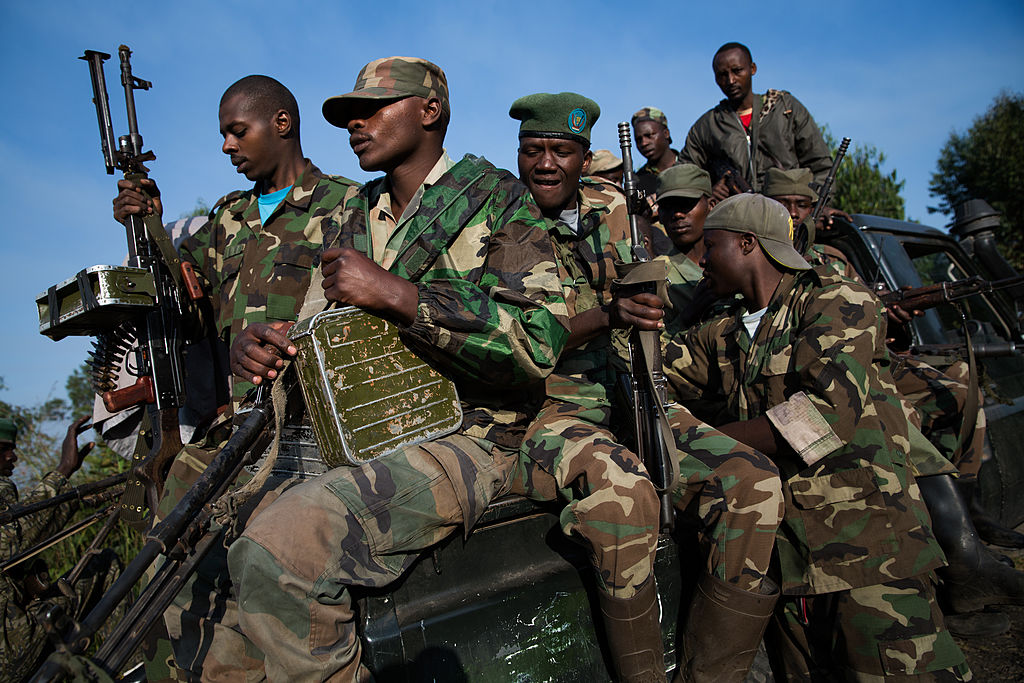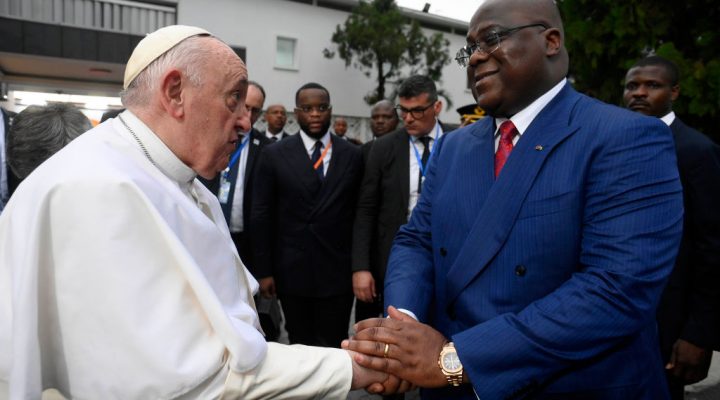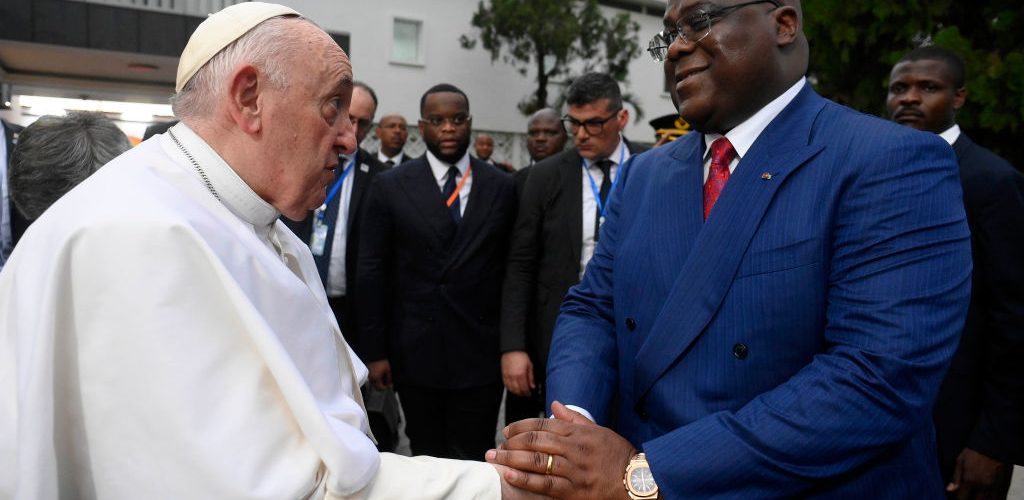Barely a week after Pope Francis concluded his two-nation, six-day tour of Africa early this year, fighting broke out, engineered by rebel fighters in one of the two nations — the Democratic Republic of Congo.
The situation contrasts with the hope raised by the visit from Francis, whose arrival sparked optimism about ending a long-standing conflict.
Like South Sudan, the other country Francis toured on his Africa trip, the Democratic Republic of Congo — DRC — has long been plagued by conflict. Across more than two decades, DRC’s government and rebel forces have battled for control of the mineral-rich country. The war has made life a living hell for many Congolese.
Recalling his visit, Francis described DRC as “a land rich in resources and bloodied by a war that never ends because there are always those who feed the fire.” The country has “for years been torn apart by war between armed groups maneuvered by economic and political interests,” he said, noting “people live in fear and insecurity, sacrificed on the altar of illicit deals.”
“Pilgrimage of peace”
Regarding South Sudan, Francis also spoke of his “ecumenical pilgrimage of peace,” which was “the culmination of a journey that began some years ago,” when he met with leaders of the country and urged them “to make a commitment to overcome the conflict and build peace.”
Unfortunately, that reconciliation effort in 2019 was not advanced. “The newly born South Sudan … is a victim of the old logic of power and rivalry, which produces war, violence, refugees and internally displaced persons,” he said.
“In the face of all this, I have said two words. The first is negative: ‘Enough!’ Stop exploiting Africa! The second is positive: ‘Together.’ Together with dignity and mutual respect; together in the name of Christ, our hope.”
Francis then spoke of hope to people of both countries, starting with Congo: “In the face of all this, I have said two words. The first is negative: ‘Enough!’ Stop exploiting Africa! The second is positive: ‘Together.’ Together with dignity and mutual respect; together in the name of Christ, our hope.”
That message did not resonate with the rebel fighters, known as M23. No sooner had the pope returned to the Vatican than they took up arms and began to march toward what some believe to be Goma, in the eastern part of the country.
M23 derived its name from a March 23, 2009, peace deal that didn’t materialize as planned. It occurred years after rebel groups began terrorizing inhabitants of the country in the aftermath of the Rwandan genocide of 1994. Back then, Hutu were perpetrators of the genocide, and Tutsis, their main targets, escaped from Rwanda to neighboring DRC.
Scuttling peace
The M23 rebels accuse the DRC government of scuttling the peace deal. In taking up arms again, the rebels also disregarded the message of leaders of east African countries who recently met in Bujumbura and called for a cessation of conflict.
The latest round of unrest in DRC saw many people fleeing their homes as the M23 rebel forces continued their advance. Villagers scrambled to begin a journey to nowhere. As usual, innocent civilians have been at the receiving end of the conflict. Many Congolese women demonstrated against the war and suffering.
The renewed hostility is a huge blow to the peace initiative of Francis, who received a rousing reception when he arrived in the beleaguered country. Ongoing fighting says something about the nature of those fueling the crisis.
“The human rights situation across the Democratic Republic of Congo remains dire, with internal conflicts and poor governance contributing to a severe food crisis and the internal displacement of nearly 5.5 million people, more than anywhere else in Africa.”
“The human rights situation across the Democratic Republic of Congo remains dire, with internal conflicts and poor governance contributing to a severe food crisis and the internal displacement of nearly 5.5 million people, more than anywhere else in Africa,” Human Rights Watch reported.
“Over 100 armed groups are active in eastern Congo, and the imposition of martial law has facilitated abuses by government security forces,” the peace organization said. “Armed groups and often abusive security forces continue to carry out massacres, abductions, rape and sexual violence, recruitment of children, and other attacks on civilians with near total impunity. The rights to freedom of expression, peaceful assembly and the media are frequently under attack.”
Fueling the conflict
The DRC government and some analysts have accused Rwanda, led by Paul Kagame, of fueling the conflict by backing and equipping the rebels. The M23 rebels are believed to be spearheaded by the Tutsi, an ethnic group also found in Rwanda.
A group of United Nations experts last year cited “substantial evidence” Rwanda was a destabilizing influence in DRC through the rebels. The Rwandan government continues to deny such claims.
Countering, the Rwandan government has accused the DRC government, led by Felix Tshisekedi, of seeking to destabilize its country.
“The fact is that there have been attacks and shelling from the DRC into Rwandan territory on multiple occasions, resulting in fatalities and destruction of property,” the Rwandan government insisted. “Investigations have been made and were even part of the UN group of experts’ report in June. Rwanda has a legitimate and sovereign right to defend our territory and citizens and not just wait for disaster to unfold.
“The presence of M23 and its origins are well-known as a problem of the DRC, which they seek to make a burden of other countries,” the Rwandan statement said. It claimed Rwanda had disarmed M23 fighters far from the DRC border.

Armed members of the M23 rebel group travel to a frontline position overlooking Goma, in the shadow of the Nyiragongo Volcano, in the eastern Democratic Republic of Congo (DRC) June 07, 2013.
(Photo/Getty)
“Others scattered in the region, who are in conflict with their government, are not Rwanda’s responsibility. Rwanda also hosts tens of thousands of Congolese refugees, many for more than 25 years,” the statement noted.
Dire situation
Stephen Chan, a professor of politics and international relations at the University of London’s School of Oriental and African Studies, said the situation in DRC and South Sudan is dire.
“Conflict and corruption are especially great in these two countries. Most of the economy is transacted through informal and corrupt means. … In a real sense, corruption and war are structurally embedded in these two countries.”
“Conflict and corruption are especially great in these two countries,” he reported. “Most of the economy is transacted through informal and corrupt means, and a lot is directed to war efforts and profiteering from war. In a real sense, corruption and war are structurally embedded in these two countries.”
“Even a pope can have only limited effect in such conditions,” he said, adding Francis’ mediation role in both countries was altruistic.
“It was a sincere gesture on the part of Francis,” he said. “His impact may have been greater in South Sudan rather than in the much more populous DRC. The Catholic Church has a huge following in both countries. Francis hoped for a popular groundswell against violence and corruption. … Such groundswells in the past have accomplished nothing. Nor has moral pressure on leaders accomplished anything lasting.”
To that extent, Chan said he sees no light at the end of the tunnel as far as securing peace in DRC is concerned.
“No arms will be laid down,” he said, noting in South Sudan “Francis did, however, very much imply that President Salva Kiir could have done and should do much more.”
Anthony Akaeze is a Nigerian-born freelance journalist who lives in Houston. He covers Africa for BNG.
Related articles:
Pope Francis arrives in Africa on a two-nation tour seeking peace amid decades of conflict
Mother’s death, Hurricane Florence devastation, bewilder Congo refugees
Member of U.S. Baptist church deported to the Republic of Congo


